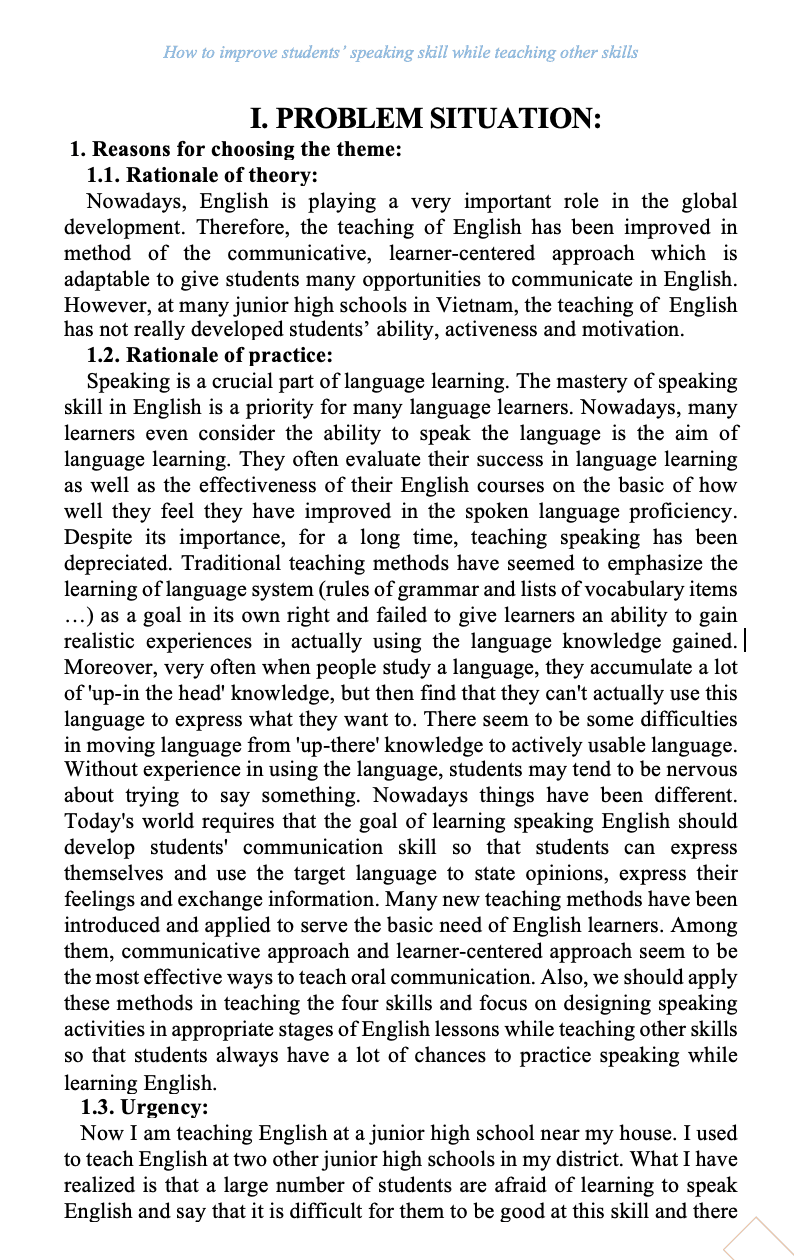SKKN How to improve students’ speaking skill while teaching other skills
- Mã tài liệu: BM9226 Copy
| Môn: | Tiếng anh |
| Lớp: | 9 |
| Bộ sách: | |
| Lượt xem: | 3087 |
| Lượt tải: | 15 |
| Số trang: | 34 |
| Tác giả: | Trần Thị Thanh Vân |
| Trình độ chuyên môn: | Cử nhân đại học |
| Đơn vị công tác: | Trường THCS Biên Giang |
| Năm viết: | 2020-2021 |
| Số trang: | 34 |
| Tác giả: | Trần Thị Thanh Vân |
| Trình độ chuyên môn: | Cử nhân đại học |
| Đơn vị công tác: | Trường THCS Biên Giang |
| Năm viết: | 2020-2021 |
Sáng kiến kinh nghiệm “SKKN How to improve students’ speaking skill while teaching other skills” triển khai gồm các biện pháp nổi bật sau:
3.1. Firstly, teachers must make sure that students feel safe and confident while they express themselves
3.2. Secondly, teachers must pay attention to warm-up activities
3.3. Thirdly, students must be well-prepared and well-instructed before they practice speaking English
3.4. Fourthly, varying communicative activities is also important
3.5. Last but not least, teachers should also pay attention to these points
Mô tả sản phẩm
- PROBLEM SITUATION:
- Reasons for choosing the theme:
1.1. Rationale of theory:
Nowadays, English is playing a very important role in the global development. Therefore, the teaching of English has been improved in method of the communicative, learner-centered approach which is adaptable to give students many opportunities to communicate in English. However, at many junior high schools in Vietnam, the teaching of English has not really developed students’ ability, activeness and motivation.
1.2. Rationale of practice:
Speaking is a crucial part of language learning. The mastery of speaking skill in English is a priority for many language learners. Nowadays, many learners even consider the ability to speak the language is the aim of language learning. They often evaluate their success in language learning as well as the effectiveness of their English courses on the basic of how well they feel they have improved in the spoken language proficiency. Despite its importance, for a long time, teaching speaking has been depreciated. Traditional teaching methods have seemed to emphasize the learning of language system (rules of grammar and lists of vocabulary items …) as a goal in its own right and failed to give learners an ability to gain realistic experiences in actually using the language knowledge gained. Moreover, very often when people study a language, they accumulate a lot of ‘up-in the head’ knowledge, but then find that they can’t actually use this language to express what they want to. There seem to be some difficulties in moving language from ‘up-there’ knowledge to actively usable language. Without experience in using the language, students may tend to be nervous about trying to say something. Nowadays things have been different. Today’s world requires that the goal of learning speaking English should develop students’ communication skill so that students can express themselves and use the target language to state opinions, express their feelings and exchange information. Many new teaching methods have been introduced and applied to serve the basic need of English learners. Among them, communicative approach and learner-centered approach seem to be the most effective ways to teach oral communication. Also, we should apply these methods in teaching the four skills and focus on designing speaking activities in appropriate stages of English lessons while teaching other skills so that students always have a lot of chances to practice speaking while learning English.
1.3. Urgency:
Now I am teaching English at a junior high school near my house. I used to teach English at two other junior high schools in my district. What I have realized is that a large number of students are afraid of learning to speak English and say that it is difficult for them to be good at this skill and there is not a real language environment for them to do their practice every day. Moreover, their awareness of importance of being good at this skill is not really made clear because speaking skill is not usually included in their exams, so they often learn English only for their written exams, not for communication. In addition, some teachers of English do not still manage to put real interest in their lessons. Another reason is because of the lack of necessary equipment for teaching English at many schools in Viet Nam. Indeed, the school where I am working as a teacher of English has been famous for its good quality in education for years. Most students of my school are well brought up by their parents and they identify a good motivation in their studying, which leads to their better study results for English as well as other subjects at school. However, according to the survey carried out at the beginning of this school year at my school, more than 70% of the students reported that they are worried about their English speaking skill. They said that they could hardly make a simple conversation in English or express what they thought. Importantly, most of them assumed that speaking is very difficult for them to master. Therefore, if students do not learn how to speak or do not get many opportunities to speak in the language classroom, they may soon get de-motivated and lose interest in learning. On the other hand, if the right activities are taught in the right way, speaking in class can be a lot of fun, raising general learner motivation and making the English language classroom fun and dynamic.
1.4. My ability:
Necessarily, among the teachers of my school I should work harder and harder so as to master the language and always give my students good lessons, which means that my students always have the chance to develop their speaking skill in the language. That is the matter I have been absorbed in and that is the reason for my theme.
- Purpose of study:
I would like to give out some of my own experience in improving students’ ability of speaking English.
- Researched knowledge:
Ways to make students more excited about developing their speaking skill and ways to encourage students to feel confident enough to express their ideas in front of the class.
- Researched participants:
Students of my junior high school.
- Ways to conduct the theme:
– My real teaching at my school
– Surveys
- Time and place for conducting the theme:
– Time: School year ………- Place: At my junior high school
- PROBLEM SOLUTION:
- Logical basis:
The goal of teaching speaking skills is communicative efficiency. Learners should be able to make themselves understood.
To help students develop communicative efficiency in speaking, instructors can use a balanced activities approach that combines language input, structured output, and communicative output.
- Practical basis:
For most learners, the ability to speak a foreign language is synonymous with knowing that language because speech is the basic means of human communication.
English learners no longer expect the traditional approach of their teachers based on developing mainly the grammatical competence and using methodology popular in the past.
Today, teachers are expected to provide their students with useful active knowledge of the foreign language, not just theory about the language.
- Developing students’ speaking skill while teaching speaking itself:
There are many rules teachers of English must remember while teaching speaking so that they can help students improve their speaking skill.
3.1. Firstly, teachers must make sure that students feel safe and confident while they express themselves:
In my point of view, the first thing that teachers have to do to help students improve their speaking skill is that they have to help them overcome their feelings of shyness and nervousness when practicing English in their class. One of the best ways to solve this problem is to put them in ‘safe’ situations in class where they are inspired and encouraged to manage to use the language from their background. Organizing communicative activities in pairs, in groups is also an effective way to serve this aim. Working in pairs, in groups, students will feel less anxious when they are ‘on show’ in front of the whole class together. Moreover, pair-work and group-work can help shy students who would never say anything in a whole class activity have the confidence to open their mouths. Students can also learn from one another’s new ideas so that they will have something to speak in front of the class later. Another thing that teachers should remember to help students have confidence in speaking is teachers’ positive correction and feedback. Making errors is a natural and unavoidable part of the learning process, but how to correct students’ errors is particularly important. Teachers need to provide appropriate feedbacks and corrections, but they ought not to interrupt the flow of communication. Teachers should take notes while pairs or groups are talking and address the problems to the class after the activity without embarrassing the student who made the error. Teachers can also write the errors on the board and ask who can correct it. Teachers should encourage their students to speak whatever they can and focus on what they have got right, not on what they have got wrong. Teachers should also help them to develop positive attitudes towards their friends’ errors and to correct themselves. Teachers should try to develop for themselves positive strategies of error corrections. When students achieve success in oral communication, they will feel confident and secure and they will enjoy learning English. Also, they will have confidence to take part in communicative activities later.
3.2. Secondly, teachers must pay attention to warm-up activities:
Warm-up is also an important part which contributes to the success of a speaking lesson. Warm-ups help learners put aside their daily distractions and focus on English. Warm-ups also encourage whole-group participation which can build a sense of community within the group and warm-ups can help to arouse students’ interest in speaking.
Teachers should vary warm-up activities to attract students’ attention and interest because if they feel excited about their lessons from the beginning, they will make a good contribution to it. In order to give students exciting readiness for their speaking lesson, teachers can do different things to arouse students’ interest by using various teaching techniques such as brainstorming, word web, chatting, etc.
Before a new lesson I often motivate my students by chatting to them about the topic of interest, giving them preparation tasks or quick warm-up to get them in the right mood for the new lesson. Brainstorming is one of the simplest teaching techniques, but it is one of the most effective kinds of motivation because it takes a short time. I can write key words on the blackboard and the class is encouraged to think of ideas, words, phrases associated with them.
I have taught my grade 8 students English as a selective subject since the beginning of this school year. The following slide was designed on my power point lesson plan for one speaking lesson (Grade 8 selective subject – Period 5).
My students were divided into two teams. The first team tried to put as many adjectives describing people’s characters as they could around the key word “CHARACTERS” and the second team tried to do the similar thing with the key word “APPEARANCE”. When the time allowed was over, the team with more correct words was the winner. After that, the class was required to predict the topic of the speaking lesson.
The fact is that they were really interested in their speaking topic “DESCRIBING PEOPLE”
TÀI LIỆU LIÊN QUAN
- 0
- 114
- 1
- [product_views]
- 2
- 163
- 2
- [product_views]
- 3
- 183
- 3
- [product_views]
- 0
- 124
- 4
- [product_views]
- 0
- 134
- 5
- [product_views]
- 0
- 109
- 6
- [product_views]
- 5
- 101
- 7
- [product_views]
- 7
- 117
- 8
- [product_views]
- 1
- 174
- 9
- [product_views]
- 8
- 179
- 10
- [product_views]
















